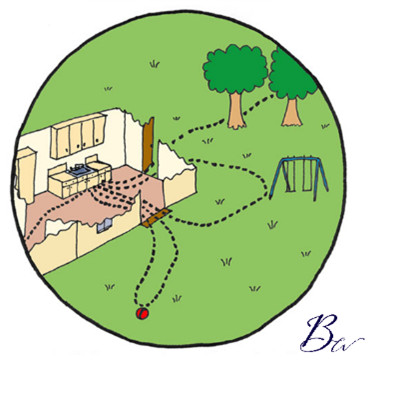Why Your High-Performing Team Isn’t Performing Anymore
By Kim Fons There are many frameworks for developing a high-performing team, and many reasons the team needs to evolve over time. Tuckman’s four stages of forming, storming, norming, and performing are probably the most well-known but the linear model of team development just doesn’t exist in real life. In my experience, a team’s developmental journey looks more like the old Family Circus cartoons where Billy wandered all over the neighborhood.
There are many frameworks for developing a high-performing team, and many reasons the team needs to evolve over time. Tuckman’s four stages of forming, storming, norming, and performing are probably the most well-known but the linear model of team development just doesn’t exist in real life. In my experience, a team’s developmental journey looks more like the old Family Circus cartoons where Billy wandered all over the neighborhood.
 Teaming happens in fits, starts, re-starts, circles, and back-steps. There is no magical end-point where a team can say “YES, we are here.” High Performing teams remain high performing by constantly shifting and adapting. The need to adapt can come when a new member enters the group, causing everyone to shift back into the essential steps of trust-building and establishing norms. A new team leader can necessitate radical change in the culture and the collective purpose of the team, but their ability to refocus the team may be constrained by the historical legacy of their predecessor. Old habits die hard.
Teaming happens in fits, starts, re-starts, circles, and back-steps. There is no magical end-point where a team can say “YES, we are here.” High Performing teams remain high performing by constantly shifting and adapting. The need to adapt can come when a new member enters the group, causing everyone to shift back into the essential steps of trust-building and establishing norms. A new team leader can necessitate radical change in the culture and the collective purpose of the team, but their ability to refocus the team may be constrained by the historical legacy of their predecessor. Old habits die hard.
Influencing factors come from outside the team as well. External stakeholders, changes in the economy, policies, or world circumstances all have a tremendous capacity to force a team to change its dynamic and trajectory. With all the ever-changing and moving parts, successful teams must commit to regular evaluation and evolution. This intentional and systemic approach to team evolution allows the team to adapt and grow amid changing contexts.
Teaming in the real world is anything but linear. A team’s collective purpose may be the most “fixed” element, but in a rapidly changing world, it too needs to evolve. Professional coaches are often brought in to work with teams that need help starting the process or those which have become stale. For the latter, the temptation is to try and fix a few, fairly obvious barriers (such as lack of trust) but those fixes are usually fleeting and short-lived. Stasis is the enemy of evolution – changes and adjustments are needed, or the team will eventually decay.
I recently completed coaching with a team and they threw a little party. We had fun looking back on all the growth they had accomplished. As I left their group, I challenged them with a question that I share with you now:
“How will you include intentional reflection and an expectation of adaptation in your regular, everyday processes?”

 Teaming happens in fits, starts, re-starts, circles, and back-steps. There is no magical end-point where a team can say “YES, we are here.” High Performing teams remain high performing by constantly shifting and adapting. The need to adapt can come when a new member enters the group, causing everyone to shift back into the essential steps of trust-building and establishing norms. A new team leader can necessitate radical change in the culture and the collective purpose of the team, but their ability to refocus the team may be constrained by the historical legacy of their predecessor. Old habits die hard.
Teaming happens in fits, starts, re-starts, circles, and back-steps. There is no magical end-point where a team can say “YES, we are here.” High Performing teams remain high performing by constantly shifting and adapting. The need to adapt can come when a new member enters the group, causing everyone to shift back into the essential steps of trust-building and establishing norms. A new team leader can necessitate radical change in the culture and the collective purpose of the team, but their ability to refocus the team may be constrained by the historical legacy of their predecessor. Old habits die hard.